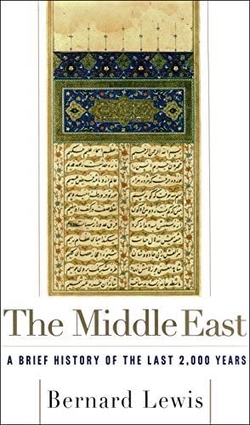 Bernard Lewis begins his remarkable survey of Middle Eastern history by conjuring up an ordinary coffee-house in a country like Turkey or Egypt or Iran. It's a commonplace scene - "men sitting at a table drinking a cup of coffee or tea, perhaps smoking a cigarette, reading a newspaper, playing a board game," with a radio or television playing in the corner.
Bernard Lewis begins his remarkable survey of Middle Eastern history by conjuring up an ordinary coffee-house in a country like Turkey or Egypt or Iran. It's a commonplace scene - "men sitting at a table drinking a cup of coffee or tea, perhaps smoking a cigarette, reading a newspaper, playing a board game," with a radio or television playing in the corner.
Mr. Lewis then proceeds to deconstruct the major elements of this picture, in the process showing how its elements nearly all derive from the West. The coffee-house habitués wear Western-style clothes; the eyeglasses and watches on them were developed wholly in the West. Tables and chairs spread with colonialism, replacing cushions and hassocks. Tobacco comes from America. Newspapers come from Europe, of course, as does nearly all their content, from political coverage to the comics. The same goes for radio and television, including the musical programs. Only the coffee and the board games can boast local origins.
This coffee-house setting permits Mr. Lewis neatly to establish one of his book's major themes: to understand the Middle East today means comprehending the "rapid and enforced change" it endured under a Western onslaught that has now lasted for two centuries. And to see Western influence in context in turn requires a much deeper immersion into the Middle Eastern experience. That is precisely what Mr. Lewis then proceeds to offer the reader in a pathbreaking history of the Middle East's past two millennia.
In several ways, the Lewis version of this history improves on that offered by his predecessors. First, it starts not with the seventh century, when Islam originated, but goes the whole back to the time of Jesus. While acknowledging that "the advent of Islamic domination ... clearly marked the beginning of a new society," the author takes pains to show continuities with the ancient Near East. This has the distinct virtue of placing Islamic history in context, rather than seeing it as an almost complete innovation.
Second, Mr. Lewis aspires to do more than recite names and dates; he hopes to convey something of the texture of Middle Eastern life. As the coffee-house vignette suggests, his is a thoroughly modern history, full of striking details and illustrative personalities. The necessary political narrative is there as history's backbone, but the social, economic, and cultural areas - precisely those most likely to intrigue the Western reader - flesh out the study. For example, Mr. Lewis succinctly notes a seemingly subtle difference in farming has profound implications: "In Western Europe, agriculture and stock raising have been closely associated, often, indeed, in the same hands. In the Middle East, there is an immemorial separation and conflict between the peasant and the nomad." Much of Middle Eastern history follows from this simple fact, including its political experience and its economic rhythms.
While some of his information will no doubt be familiar to a reader with basic knowledge of the Middle East, Mr. Lewis draws extensively on his own original research, insuring that much of his book will be novel even to the most practiced Middle East hand. More: A Brief History aspires to the sophistication found in histories of Europe and the United States - a noteworthy achievement given how thinly, compared to those regions, the Middle East has been studied.
Third, the author resists the small-minded orthodoxies of political correctness. Rather than take ritualistically blame European imperialism for the Middle East's current woes, he praises the brief era of Anglo-French domination of the Middle East as "an interlude of liberal economy and political freedom." Rather than accept the Middle East's current enthusiasm for fundamentalist Islam as a repudiation of Western ways, he looks below the surface and finds the region Westernizing despite itself: "the rejection of the West and its offerings is by no means as comprehensive and as undiscriminating as propaganda might indicate"; quite a few importations from the lands of unbelief, he notes, remain "very welcome."
Finally, the book is exceedingly well written. Recently dubbed "one of the great prose writers of the last fifty years," Mr. Lewis has a knack for the vignette, the turn of phrase, and the telling quotation; in addition, he unravels complex issues (such as the impact of French revolutionary ideas on the Middle East) so that one hardly notices their difficulty.
Looking to the future, Mr. Lewis sees the Middle East's two centuries under the Western thumb at an end and sees the region at the start of a new era. Foreign powers have recently made it clear that, at most, they will "act to defend their own interests, that is to say, markets and oil, and the interests of the international community," but not more. Overthrow Saddam Hussein? That's up to the Iraqis. Reconstruct Lebanon and Afghanistan? No thanks, not our business. For all that Middle Easterners continue to blame the West for their problems, he writes, they alone "can decide whether and how to use this window of opportunity while, in an interval of their troubled modern history, it remains open."
Mr. Lewis wrote his first published article in 1936. Now, on the eve of his 80th birthday later this month, he has written a fitting capstone to his long career, surveying with broad strokes so many of the topics he has previously written about in more detail. The reader can now benefit from this lifetime of study within the covers of a single book.
